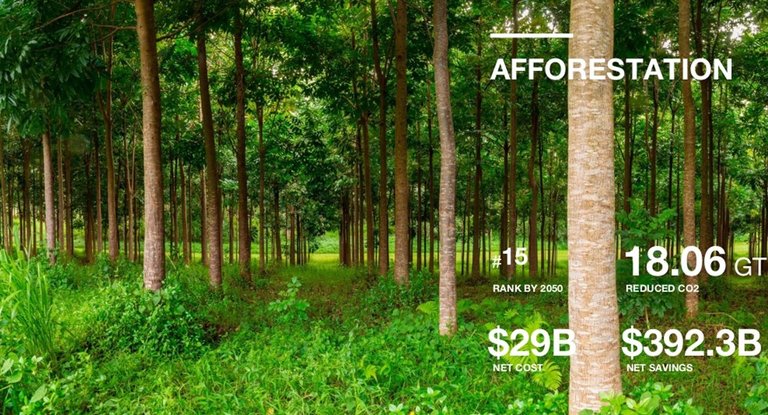

Preface
In April 2017, half way through my online PDC, I encountered a very interesting new climate study by the awkward name of „Drawdown: The Most Comprehensive Plan Ever Proposed to Reverse Global Warming“ which was released just a few days before. It caught my attention, because Paul Hawken presented his research in a very different way. Rather than finding out who the worst CO2 producers are, they focussed on the solutions and went out to find what the biggest chances for CO2 mitigation are and printed 100 soultions into a well categorized book.
I was faszinated by this new perspective, as Permaculture itself is a solution based design diciplin. There is even a saying in the world of Permaculture, saying: „The Problem is the Solution“. I already spent lots of time wrapping my head around that saying and often finding and loosing the understanding for this simple slogan. But it makes perfect sence, once you got it.
From inside DRAWDOWN.
Here are some slides that where used during Paul Hawkens presentation. You always see the CO2 mitigation rank number indicated, the ammount of potential GigaTons CO2 reduction, the NET costs and the NET savings in USD.
All images shown in this post are taken from Paul Hawkens offical book presentation.
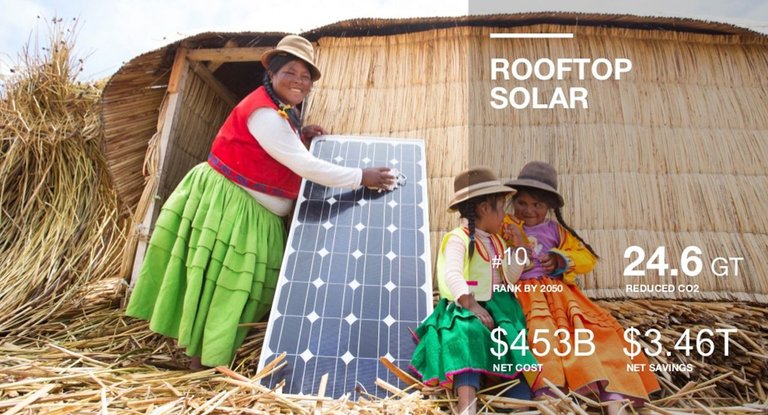
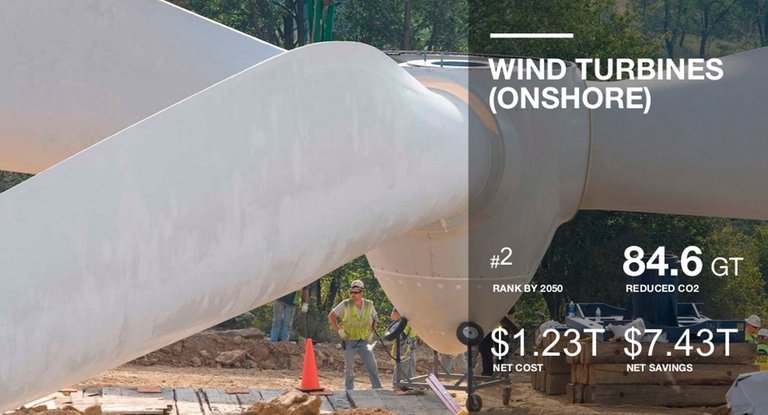

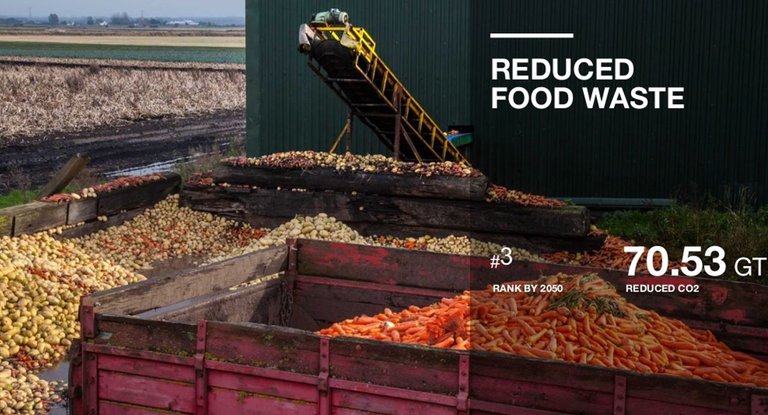
So in a huge multicultural team, living all over the world, 120 advidsors of geologists, botanists, biologists, artists, activists, politicians, teachers and many more did the math on loads of research and worked hard to represent their findings in a very clear and well understandable format. All ranks and calculations where made in reguard of the year 2050 (check out my population article on 2050). By the way this research and presentation was one big reason I am not afraight of 10 billion people on this earth by 2050.


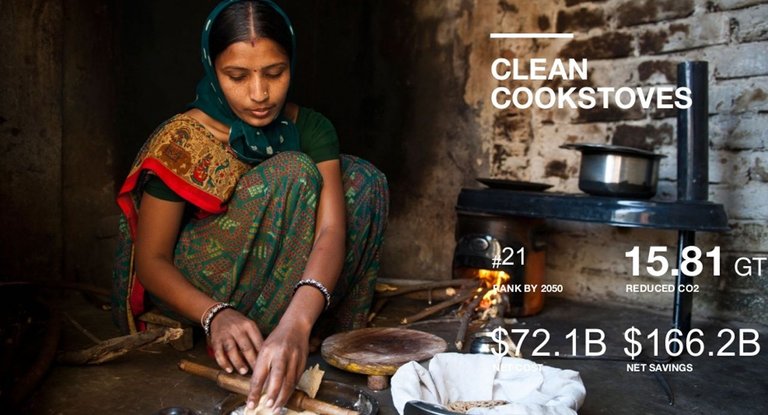

Charts & Overview.
At last, please check out the following charts that really baffled me.
The biggest potential of CO2 savings come from the heart of our homesteaders life. It comes from food and consits of: Reduction of food waste, Plant-Rich Diet, Silvopasture, Regenerative Agriculture and so on. We basically work on the heart of the Solution for a better world. That is very amazing! It also surprised me how small CO2 savings in the transport sector are.
With this last graphic showing each potential in order of size, I was thrilled about the immense potential by just educating girls all over the globe and also emancipating them to family planning. The top ten of this diagram are the essential solutions our societies have to aim for till 2050.
Links.
-Project Drawdown Webpage
-All 100 solutions by rank
The Video.
Here is the original video of the book presentation I saw April last year. Just skip the cheesy introduction speeches and get right into the hot matter Paul Hawken presents here:
Aftermath.
This piece of research is full of solutions, hope and positivity and that is what is so convincing about it. I am really sick of knowing about more problems in this world and on this planet. Aren‘t we all peped (from „pep talk“) enough? We need solutions and not more problems. Permaculture is not about reducing our foorprint on this planet. Its about intensely increasing our footprint by interacting with nature in a way that ecosystemic regeneration is boosted with simultaneous abundand yields for humans, animals and plants and thriving life! Permaculture is an intese footprint lifestyle filled with healing solutions! It is not a lifestyle of abstinence and enumerating problems!
All images shown in this post are taken from Paul Hawkens offical book presentation.
As always, thanks for tuning in.
Moritz
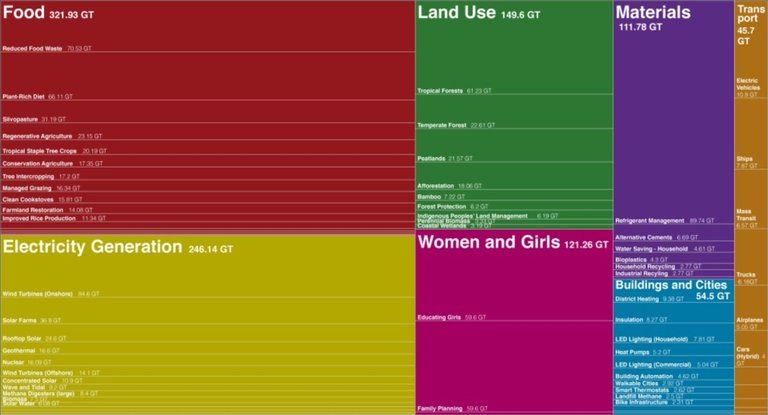
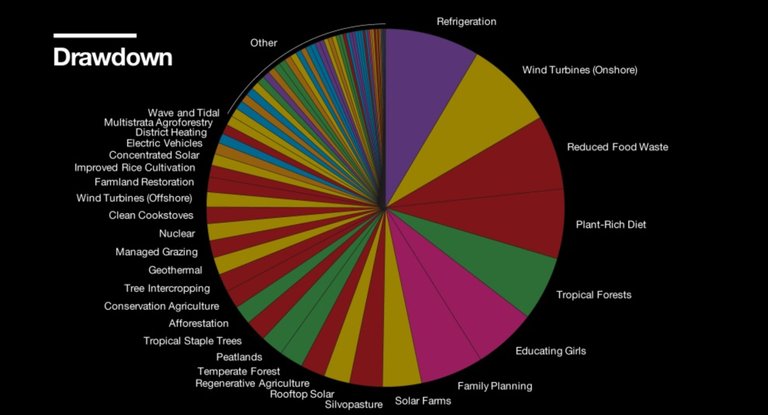
I agree it is time to hear about solutions and then implement them. Lets get to the positive side of things.
Thanks for sharing!
Dear @carey-page.
It is important that we "switch sides". Permaculture is about demonstrating rather than protesting. There is a fine difference here. In Permaculture we demostrate solutions and might stay away from protesting on the streets. The good thing is: we have all the informations available now and more widely accessible through the internet. It is just upon us to act upon these simple models and throug a powerful grassroot movement we will change how this planet is run.
I'm afraid that seeing turbines and solar parks mentioned as viable solutions to global warming makes me very suspicious: both are incredibly energy-intensive and highly destructive to natural ecosystems. I don't see how they can have any place in a serious attempt to combat changing weather. And as for rice cultivation: we all know just how keen companies like Monsanto are to clothe their attempts to totally control the market in a cloak of eco-responsability. Sorry, but you've left me totally unconvinced by Mr Hawken.
Dear @nicksikorski. Thank you for your comment.
Please lets take this apart. I am very curious.
Both energy forms mentioned by you are in the top 10 (http://www.drawdown.org/solutions), yet they are split up in different types.
Wind:
In the wind category only the Onshore Wind made it in to the top 10 and on prominent place 2. Offshore Wind was palced 22 and Micro Wind was placed 76.
I myself did a little research a few years ago while thinking about installing a micro wind on a house and found, that on-shore wind mills would have an energy payback period averaging at about 5-12 months when looking at a cradle-to-grave life-cycle assessment. These insanely low numbers made me always think that the ecological impact would be low as well.
Why do you think that wind turbines are so destructive to natural ecosystems?
Solar:
About solar I do agree agree with you, yet contemporary Solar got much better and their energy payback period is averaging at about 1-3 years when looking at a cradle-to-grave life-cycle assessment, depending on which technology one assesses. This really surprised me, but maybe the informations I was remembering got old and invalid after decades of intense development of making this technology more energy efficient and morte ecological.
Solar energies all score top 10 with Solar Farms on place 8 and Rooftop Solar on place 10.
Why do you think that solar energy is so destructive to natural ecosystems?
The original reason I wanted to talk about this study here, was that I was flabergasted about the high score the summ of food production made. Also the Women Education adn Women Family Planning where very surprising high scores.
And last question: What would you see as the most ecofriendly future energy alternatives to coal and nuclear?
All the best.
Moritz
Hello Moritz @my-permaculture ! Sorry if my tone sounded a little aggressive...
My main problem with this kind of ranking is that is invariably put together by "scientists" with very little to no experience of what actually goes on in real life and who seem to think that it is far better to spend your life behind a computer screen drawing up excel sheets and filtering dubiously-acquired data than it it to get outside, get your hands dirty and starting producing food and restoring natural ecosystems. As a result, their conclusions show total disregard for natural systems, rely solely on modern technology (at the obvious expense of common sense) and do little more than reflect current governmental policy, neo-liberal thought and industrial strategy. This is something that was made very clear to me when I attended the PIC in London two years ago. Whilst the actual permaculturists giving talks had experience of working with literally thousands of farmers, got their hands dirty on a daily basis and had nothing but love and respect for the people in the regions where they working, the academics who had deigned to come down from their ivory towers to address us relied purely on powerpoint presentations, endless and obscure figures, and blamed virtually everything on population growth in the third world. I was left offended and disgusted by their approach and increasingly respectful of genuine permaculturists like Geoff Lawton. Anyway, that is my basic feeling.
As for the specific technologies mentioned, this is what I have to say.
Wind farms onshore and offshore consume vast amounts of energy in their fabrication (most often not taken into account when calculating energy efficiency), require the destruction of large areas of land and sea for their construction (these are big, heavy, massive structures, resisting extremely strong forces and must be very stably anchored in thousands of square metres of concrete) and are relatively inefficient, producing large amounts of energy -- that most often cannot be stored -- intermittently and unreliably. They are also a financial drain on public resources: in Scotland where I come from, the operating companies are routinely refunded for energy NOT collected when winds do not blow as expected or when too much energy is produced at any one time and cannot be stored (and sold on later). Having said that, I think that small units on individual farms are a great way of producing energy (or milling, or pumping water) when used in tandem with other tools, and can be erected with very little to no impact on the environment.
As for solar, my reservations are much the same as for wind power. In other words, the materials used in the production of solar panels are expensive and in short supply and invariably stolen from poor countries at great ecological expense; they are inefficient in that they produce (or, rather, harvest) when electricity is perhaps least required, during the day (at least the wind can be relied upon to blow at night) and the batteries used are not always efficient; solar farms are also destructive of the environment, requiring large areas of land to be literally killed -- using huge quantities of pesticides and herbicides (ever seen anyone cutting weeds in a solar park?!) for a permanent effect -- and flattened in order for them to be operated effectively. That being said -- once again -- solar panels on individual houses have, I think, a far higher rate of efficiency and use and I am not against them, just industrial parks.
It is also important to note that as governments provide funding and other incentives for these kinds of technologies on an industrial scale, more and more comapnies are moving into the sector, building solar parks and wind turbines without taking the time to examine the actual ecological costs and benefits: where I live in Japan, SoftBank, a mobile phone corporation, has bought a previously suspended solar park as a means of obtaining tax rebates and is preparing to operate at great consternation of the villagers who are justifiably worried about the ecological side effects. When the government is saying that wind and solar are good and is offering tax benefits, big companies like SoftBank don't give a damn what the local community has to say, they consider themselves to be in the right, full stop.
As for family planning, I thought it was common permaculture knowledge that not only is the number of human beings on the planet not the real problem (it's not how many we are, it's how we use the environment we live in that matters), but that the most effective (and humane) way to reduce births is to pull the poor up into prosperity, not poisoning them into infertility or polluting their bodies (and, subsequently, water supplies) with western-produced chemical substances.
From what I have seen, people like Hawken and all the other government funded pseudo-ecologists are little more than eugenicists, who are convinced that global warming is the fault of the poor in the third world who must be culled like savage animals. They do nothing more than parrot western neo-imperialistic propaganda and go in directly the opposite direction to permaculture: for them everything must be centralised in the hands of the state, and controlled by the financial and political elites, definitely not by the communities themselves and the people most effected by the results of their policies (how often is the ravaging effect of western bombing campaigns and western backed industrial agriculture taken into account in theses projections and proposed "solutions"?!).
I am sure you already know his, but for the benefit of those who may not have much experience of permaculture, here is a quick run-down on what I (and people like Geoff Lawton) think of the "global warming" situation:
The number one problem is the erosion of soils (not population growth or pollution, but what government gives a damn about it?!)
The number two problem is deforestation (again not population growth or pollution, again what government gives a damn about it?!)
The number three problem is pollution (and that could be easily reversed by addressing the first two problems)
Centralisation is NOT the answer, decentralisation IS. We must all act individually and together to solve this crisis, and not rely on technological "solutions" proposed by governments and government backed institutions (i.e. the majority of NGOs): not only are governments most often the ones who created the problems in the first place, but most often the solutions are not hi-tech, but lo-tech. If governments really want to get involved, they should be encouraging decentralisation, small-scale community-level hydro-electricity, wind-power and solar, not centralisation and industrial-scale. Putting an end to subsidising industrial farming, encouraging reforestation and empowering local communities is the way to go.
Anyway, I'll stop ranting now and let you have your post back! Again, I have nothing against you, but these technocrats really get me angry. Together we can win this!
All the best, Nick
Dear @nicksikorski. Thank you for your elaborate answer. This is very much appreciated! And don't worry. I never took this personal and am always interested in other peoples views. AND: we basically are on the exact same page..
We both as Permaculturists have the same education and stand behind our believes with a lot of knowlege and working solutions for many problems that need to be adressed NOW. Plus you are apperantly a big fan of Geoff Lawton, just like me.
Generally only decentralization is the answer for the big problems of our planet, so solar and wind energy for a house / homestead are great. I especially like you pointing out that wind also blows at night! Well played :D And decentralization is also so important, so that big companies like the one you cite from Japan won‘t be able to ONLY working for their own financial benefit, but would have to compete with other qualities, as the decentralized neighbouring models would set the standard...
Still I give this research more credibility than other studies, as some unexpected answers where found and not only a small team of data analytics where sitting in an institute, but a vast amount of collaborators from all over the world also including geologists, botanists, biologists, artists, activists, politicians, teachers and so on where taking part in this research and analysis..
Yet I have a question about your very interesting point about an imperialistic echo in science nowadays. Would you see Hawkens pointing out the solutions A: educating women and B: giving them the chance to plan their families as nothing else, but pointing the finger at the 3rd world? I would never have thought about that, yet with your words the fassade of these solutions starts to crumble a bit..
But please let me answer with the sudy to your top 3 CO2 problems:
You put erosion at no1. Hawkens does‘t explicitly address it. But Regenerative Agriculture is on place 11 of 100; Tree Intercroppings is on place 17 of 100; and Farmland Resoration on place 23 of 100.
You put deforestation at no 2. Hawkens puts Tropical Forests on place 5 of 100; Solvopasture on place 9 of 100; Temperate Forests on place 12 of 100; Afforestation on place 15 of 100. So they are very prominent.
You put pollution at no 3. Hawkens puts Refrigeration Management on place 1 of 100, as chemical compounds from any cooling machine are the heaviest grrenhouse gasses.
As you see I am still not quite convinced that we are looking at an other „standard“ research, quasi payed by companies and escorted by politics, but at a different kind of study, focussing on real solutions with propper backup. I understand your anger towards ivory towers academics, yet there is always an exception to the rule..
Last but not least, as I could not properly remember why, but had the feeling Geoff himself spread the word for this study once and I now remembered: Geoff himself recommendet this study in one of his Friday Five blog posts in June 2017. Him posting about it, is showing how Permaculture-compatible the outcome of this study is.
And as I was a student of Geoff Lawton for more than half a year I know his take on global warming and I share this 100%. That's why I like this study so much, as it puts the "Food" sector at number one of the solutions. That very powerful fact made me think, that Mr. Hawkens did his research right..
All the best to you Nick.
With best reguards.
Moritz
Hi Moritz! Thanks for taking the time to read my (over-)lengthy reply and not lose patience! I see that we are very much in agreement so I think I'll put a little bit more faith in this Hawken guy -- if only because I think I can trust both your and Geoff's judgement -- and take a closer look at his study. Still a little hesitant to give him any credit for what is both known to and practiced by so many in permaculture, but I'm happy to go a little more easy on him ;) Thanks for being so patient once again!
Dear Nick.
I really enjoy these "exchange of letters" kind of commentary and I am a quite patient guy, so no problem about length here :).
Just wanted to add that I do not see the content of Hawkens book as new information, but rather as a brilliant way to bring Permaculture action into everybodies life, as the study mentioned above is graphically appealing plus the information is correct and adresses the right solutions. It can be a great vehicle to bring people that are completely diconnected from regenerative agriculture or Permaculture into the game and see the challenges that can be faced with very simple solutions.
Thank you very much for this great conversation.
All the best and hope to talk to you soon again.
Moritz
Look forward to it! Take care!
I am wondering if write ups about scientific ecology content like this would be interesting for @steemstem.. Let me know.
Hello, you received a boost courtesy of @steemdunk! Steem Dunk is an automated curation platform that is easy and free for use by everyone. Need an instant boost? Send 0.200 SBD with your full post url as the memo to @steemdunk for an upvote. Join us at https://steemdunk.xyz
Upvote this comment to support the bot and increase your future rewards!
You got a 9.09% upvote from @mercurybot courtesy of @my-permaculture!
This post has received a 4.19% upvote from @aksdwi thanks to: @my-permaculture.